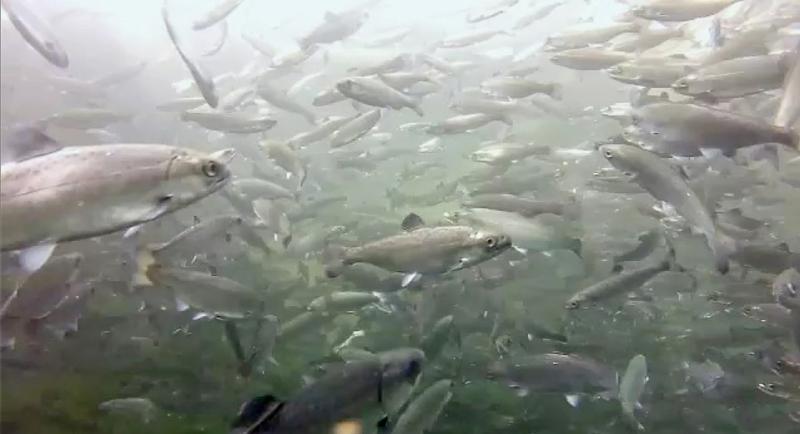
Roadway runoff known to kill Coho Salmon also affects steelhead, Chinook Salmon
by NOAA Fisheries 28 Aug 2022 11:41 NZST

Roadway runoff known to kill Coho Salmon also affects steelhead, Chinook Salmon © NOAA Fisheries
Stormwater runoff containing a toxic compound from automobile tires that washes into streams is lethal to protected coho salmon, Pacific steelhead, and Chinook salmon, according to new research published today. In contrast, sockeye salmon seem largely unaffected by the same compounds.
The newly identified risk to steelhead and Chinook salmon could help inform mitigation efforts for construction and overhaul of highways on the West Coast to ensure that future runoff is less lethal to salmon and steelhead. Some western states have already begun designing highways with inexpensive filtration measures shown to protect salmon.
"There is good news for the fish. Biofiltration appears to remove a decent amount of the toxicity," said Barbara French, a research scientist at NOAA Fisheries' Northwest Fisheries Science Center in Seattle. "As we learn more about the effects of roadway runoff on fish, we learn more about where these mitigation efforts are most warranted."
The Center has been continuously investigating the causes and conservation implications of fish deaths caused by urban runoff since 2002. This research has helped us better understand untreated stormwater runoff's scope and impact on ongoing threatened species recovery efforts, particularly in rapidly-urbanizing areas of California, Oregon, Idaho, and Washington.
Steelhead are rainbow trout that migrate to the ocean like salmon. Their range extends farther south along the West Coast than coho salmon. Some steelhead populations still return to streams in Central and Southern California, for instance. Consequently, the new research showing impacts on steelhead expands the implications for roadbuilding and reconstruction.
What is 6PDD?
The tire compound 6PDD is one of the major antioxidant compounds used to reduce the breakdown of rubber in tires. It turns into another chemical, 6PPD-quinone, that is deadly to coho salmon at extremely low concentrations and is often found in urban streams. Stormwater run-off from roads kills both juvenile and adult coho within a matter of a few hours. Even stormwater diluted to a mixture of just 5 percent highway runoff still killed juvenile coho, the new research found.
While experiments showed that juvenile steelhead and Chinook salmon were not affected as severely as coho, they also suffered from toxic runoff. NOAA's work found that 42 percent of juvenile steelhead died following 24 hours of exposure in untreated urban stormwater runoff; up to 13 percent of Chinook salmon died. In contrast, juvenile sockeye salmon survived exposure to the road runoff.
The Endangered Species Act requires that roadbuilding activities by federal agencies, or with federal funding, consider impacts on listed species. This includes the 28 species of West Coast salmon and steelhead listed as threatened and endangered. California authorities have proposed new mandates requiring tire manufacturers to seek alternatives to 6PPD.
Understanding "Sublethal" Effects
It's not clear exactly how the tire compound affects or kills fish. The scientists also called for further research to assess "sublethal toxicity." These are less obvious effects that do not kill the fish directly but may weaken them and leave them vulnerable to other forms of mortality, such as predation.
"Unfiltered runoff is exceptionally hazardous to coho" said Nat Scholz, manager of the Ecotoxicology Program at the Northwest Fisheries Science Center. "Acute fish kills are also a concern for steelhead Chinook, but both species are somewhat less sensitive, and thus future studies will need to explore more subtle forms of impaired health, or sublethal toxicity." He added "Scientists will be looking closely for long-term disruptions to gill, heart, or brain function in salmon that survive a typical storm event."
He said that other compounds in stormwater runoff that have not been identified yet may also be limiting salmon survival, and thus population recovery. More research is needed to identify these novel chemicals and better understand how they interact with other (known) urban pollutants in salmon habitats, such as petroleum-derived compounds.
He said it is also important to salmon recovery efforts to understand how and where toxics wash into salmon streams. That information will help biologists avoid habitat restoration projects that could inadvertently lure salmon back to areas affected by toxic runoff.